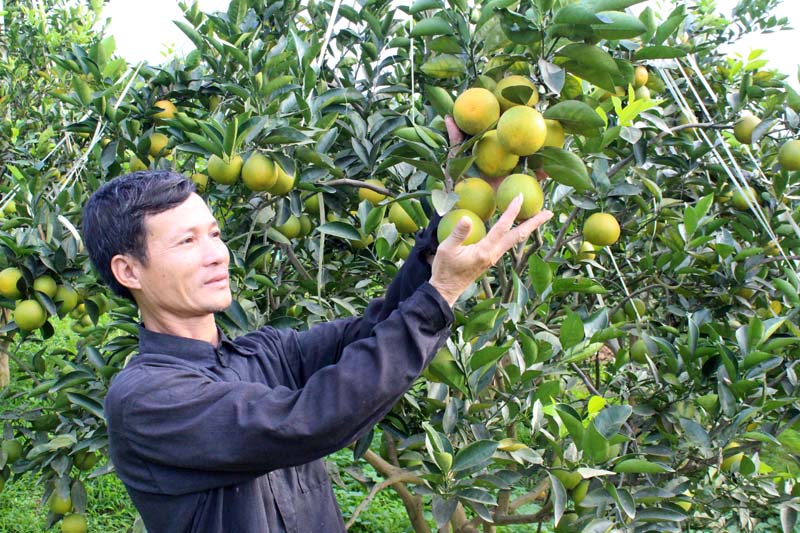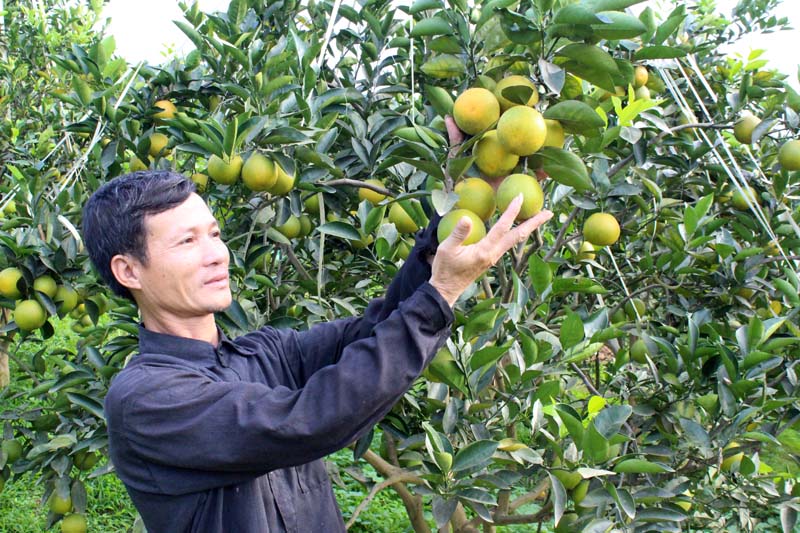
(HBO) - In 2010, many households in Tuan Lo commune (Tan Lac district) boldly replaced trees in their gardens with citrus trees, with positive outcomes recorded initially. By the end of 2018, the entire commune housed close to 50 hectares of citrus trees, of which 20 hectares were producing fruits for sales. Citrus cultivation has helped many households secure good incomes and gradually improve their living standards.

Tran
Van Tinh’s citrus garden in Tan Thanh hamlet generates between 400 and 500
million VND each year.
The entire
commune has over 10 families who have at least 1 – 2 ha or more of land under citrus
trees, while the rest have between 3,000 and 4,000 square metres or plant the
trees on their unused land lots.
Visiting
Tran Van Tinh’s citrus garden in Tan Thanh hamlet, we learned that in 2014, he
started the cultivation of 600 orange trees and 30 pomelo trees across some 1.1
hectares of land. To date, Tinh has invested about 1.6 billion VND into the
garden. All fruits from his garden are sold to traders from Hai Duong, Thai
Binh, and Hanoi. In 2017, his family sold 17 tonnes of fruits for 400 million VND.
In 2018, Canh orange suffered a crop failure due to hard weather, but Tinh harvested
and sold 7 tonnes of yellow-flesh orange, at 16,000 VND per kilo.
In order to help local households expand citrus cultivation,
the commune’sauthorities have assignedthe Community Learning Center to
work with other sectors and organisations in organising relevant training and technology transfer courses. In
2018, eightsessionsof this kind took place,
attracting a large number of families. The commune, meanwhile, joined the Vietnam
Bank for Social Policiesand Bank for Agriculture and Rural Development in helping locals access loans in line with regulations./.
According to data from the Hoa Binh Provincial Party Committee, the industrial production index for the first six months of 2025 is estimated to have increased by 20% compared to the same period last year. This marks the highest year-on-year growth rate for this period since 2020.
In the first six months of 2025, Hoa Binh province’s export turnover was estimated at 1.145 billion USD, marking an 18.11% increase compared to the same period in 2024. Import turnover was estimated at $ 804 million, a 17.15% increase, which helped the province maintain a positive trade balance.
The lives of the ethnic minority farmers in Tan Lac district have gradually improved thanks to the new directions in agricultural production. This is a testament to the collective strength fostered through the professional associations and groups implemented by various levels of the district’s Farmers’ Union.
With the motto the "product quality comes first,” after nearly one year of establishment and operation, Muong village’s Clean Food Agricultural and Commercial Cooperative, located in Cau Hamlet, Hung Son Commune (Kim Boi district), has launched reputable, high-quality agricultural products to the market that are well-received by consumers. The products such as Muong village’s pork sausage, salt-cured chicken, and salt-cured pork hocks have gradually carved out a place in the market and they are on the path to obtaining the OCOP certification.
In the past, the phrase "bumper harvest, rock-bottom prices" was a familiar refrain for Vietnamese farmers engaged in fragmented, small-scale agriculture. But today, a new spirit is emerging across rural areas of Hoa Binh province - one of collaboration, organisation, and collective economic models that provide a stable foundation for production.
Maintaining growing area codes and packing facility codes in accordance with regulations is a mandatory requirement for agricultural products to be eligible for export. Recently, the Department of Agriculture and Environment of Hoa Binh province has intensified technical supervision of designated farming areas and packing facilities to safeguard the "green passport" that enables its products to access international markets.



